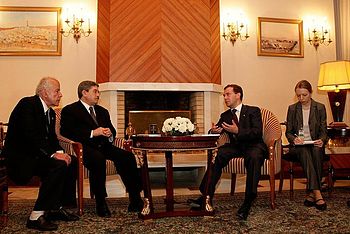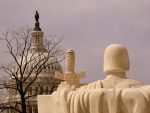Algeria: Absent State or Clique Domination?
By Abdennour Toumi

On the eve of the 60th anniversary of the Liberation War, a strange societal and political modus vivendi is taking place in Algeria, and paradoxically, there also exists a parallel for political “change” either in process or imposed. Socio-politically Algeria is no different from any other Arab country, and yet the institutional elements make the Algerian case an exception.
The recent social tensions in the country and the corruption soap-opera that touched the lung of the regime’s oil company, Sonatrach forced the President’s circle, who has been silent because of his health for almost two-years, to speak to the people. However, the major political groups in the country speak either about him or some for him. From his palace the President has asked his former Prime Minister Ahmed Ouyahia to conduct political consultations regarding constitutional reforms and is looking for a political model that could emerge through these discussions.
As if these politician-leaders are able to change the status-quo! But the silent majority is asking: is Algeria an absent State or a clique domination?
De facto, Algeria’s domestic political scene has become more fractured and unstable in the past few months. Occasional protests and sub-regional turmoil concerning national security on its eastern and southern borders continue to flare up, and so it goes, all across the country. People, political and religious forces, tribal and ethnic groups, and government agencies all attempt to answer the important issues, but in all cases they fail to do so.
Why is the country in this state of incompetency? So many genuine people, elite and politically-candid youth, are trying to rise against the mind-set of political denial and the new show-me-the-money culture that are the cause of this political impasse and economic disease. But people at high levels of power are not serious about engaging the new generation in any credible action which requires launching new and fresh ideas, listening to the people’s demands, or being prepared to make compromises, and putting the national interest of the country above personal bank interest in offshore accounts.
The regime is underestimating or miscalculating how to deal with domestic political contestation. It sees it as an existential battle as it did during its War on Terror in the Red Decade of the 90’s, where one side wins and all the other sides submit. It manages political crisis with a military mentality that goes back to the first FLN Congress in 1956 (Soumam Congress) perpetuating the official domination of the clique over the state, in other words, the domination of the military over the civilian.
Despite the on-going façade overture in the local media, the antagonists at high levels in the regime continue to operate in ways allowing them to achieve victory and eliminate others by shaping micro-economies and addressing social issues, not with public policy management, but by buying people’s loyalty and thus duping the street into believing the country’s on the right track. Hence success is measured by putting abundant goods in the market with strange fiscal codes and commercial norms as a scheme to promote the well-being of the people.
Political scientists and analysts need to consider the issues of political credibility and economic accountability as crucial factors requiring the State’s political institutions to remain solid, as long as the system continues significantly lacking in legitimacy. Parliament, judiciary and executive powers usually are less relevant than one’s clique or clan links, and military power and its fearful Intelligence Service division still dominate all the State’s affairs.
Lately the State has been caught up in a storm of critical financial affairs which, in any democratic system, would have become a serious affaire d’état. But the Algerian regime is capable of forging its national political configurations with religious, ethnic and regional clan connections in such a way to hypnotize the society and marginalize the elite.
The irony is, however, that the ordinary people at the community level tend to feel they are left alone, frustrated and powerless. 60-years later the Algerian exception seems to persist, which can erupt brutally in civil disobedience in reaction to a codified anarchy insured by the regime’s clique in power, like 1954 November generation rose up against the French occupation.
Related articles


- Israelisnipers shooting and killing hospital workers in Gaza - December 11, 2023
- CAIR Condemns Israeli Executions of Wounded, Unarmed Palestinian in West Bank - December 11, 2023
- Arab and Muslim American voters face a “simple choice” between Biden’s inhumanity and Trump’s edgy politics - December 9, 2023
























How dare you compare the uprising of 1954 and an hypothetical turmoil in the Algerian
future…Yet you seem very informed on the situation of Algeria but there is a
thing that you must learn about Algeria history… Algeria lived a decade of
blood that marked the entire society… It is by this angle that an analyst can claim
to devote himself to rhetoric and tedious analyze on Algeria when dozens of crisis around the world deserve more attention.